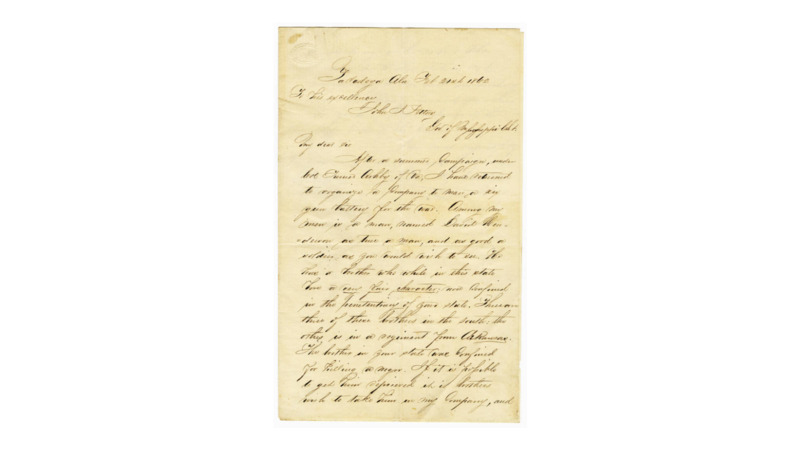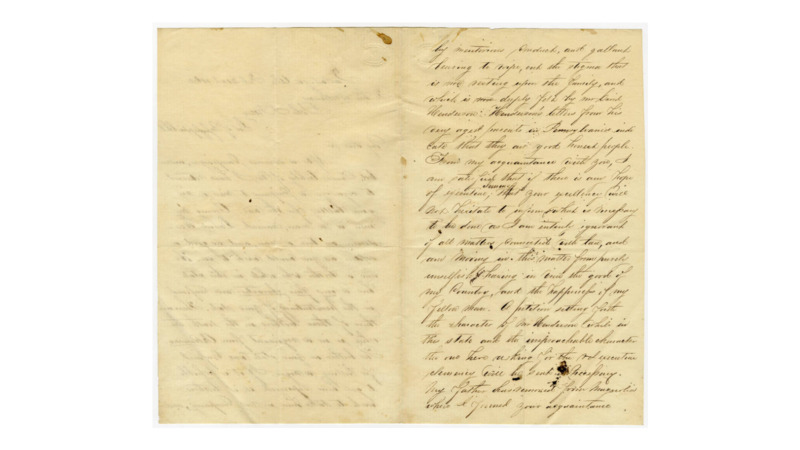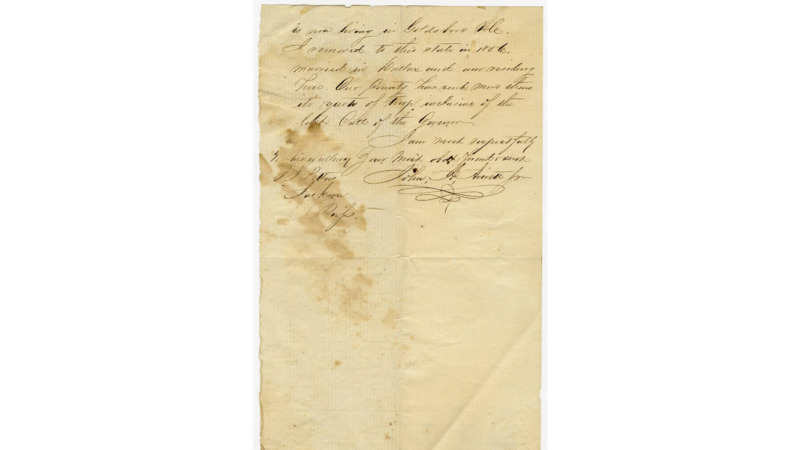The case of murder by Henderson
John M. Avirett Jr. sent this letter from Talladega, Alabama on 21 February 1862 to the Governor of Mississippi John M. Pettus. Avirett had recently been fighting in the Civil War in Colonel Turner Ashby's unit. He had returned to the area to put together an artillery company for a six gun battery. The letter was sent on behalf of a man named David Henderson, who Avirett wanted to recruit into this artillery company. Henderson had two brothers, one in Missisppi and the other in Alabama. Apparently, the Henderson brother in Mississippi had killed a black person and was in prison. The letter suggested that he was sentenced to execution. Avirett attempted to get this Henderson brother released so that he can also join his artillery company. Avirett stated that the Henderson family was suffering from the stigma of the incarceration. He also stated that the Henderson's parents, living in Pennsylvania at the time, were good and honest people. Avirett was willing to do whatever was legally necessary to gain the Henderson brother clemency, but he had no legal experience, so asked Gov. Pettus for advice. Avirett professed that he was not acting out of selfish motives, but that he simply wanted "the good of my Country, and the happiness of my fellow man." Avirett apparently was overlooking the fact that someone had been murdered!
For the remainder of the letter, Avirett engaged in small talk about where he lived (Goldsboro, Alabama) and when he moved there from Dallas (1856). He also stated that his county has provided their fair share of soldiers in the governors last call for enlistment in the Civil War.
This letter presents some challenges in interpretation because there is some significant missing information. For example, we know the name of the murder's brother, but we are never given the murder's name. Also, the victim is identified as a black person, but we don't know if the victim is male or female, much less their name. It seems as though the murder took place in Mississippi, because that is apparently where the murderer is incarcerated and was awaiting execution. Also, the reasons that Avirett requested clemency seems somewhat tenuous - he was recruiting soldiers for his artillery unit. On face value, this does not seem like a really solid legal argument for commuting a murder sentence. The fact that the victim is black may be an unarticulated reason to ask for clemency in this case. So much is unclear from this letter alone.
Is the murderer H. Henderson?
Is this the Henderson written about in John Avirett's letter? There is matching information, so it certainly is a possibility. According to this news article in the Vicksburg Whig, on a Saturday in March of 1860, a man named H. Henderson killed a male negro. Thus, the last name of the murderer and the description of the victim both match the letter. Henderson was a northerner who has only been in Mississippi for a few weeks. This appears to match with the fact stated in the letter that the Henderson brothers' parents lived in Pennsylvania.
Henderson was employed driving a stagecoach between Vicksburg and Prairie Station. Henderson had ordered the black man to tend (curry and rub down) his horses. But the task was either not completed or was not done to Henderson's satisfaction. Henderson proceeded to brutally murder this man. Henderson "hog-tied" him and beat him 175 times with a heavy leather strap from the wagon hitch. The black man's skull was fractured by the iron ring and chains attached to the strap.
Henderson was arrested and was tried before Judges Beckett and Burgess on a Monday soon afterwards. Henderson confessed to the crime, and it was he who provided the number of 175 blows. He was incarcerated without bail. The Vicksburg Whig reporter described this murder as "most foul and inhuman." The article also implies that Southern slaveholders were even reviled by the brutality of this murder - "He (Henderson) many consider himself fortunate that a mob has not already broken his neck with a rope. Southerners look upon such inhuman and diabolical murders as beyond the slow process of law, and but for the restraint of a few deliberate and cool advisers, this unmerciful man would be hanging, and justly too, to the limb of some tree."
Two men attempted to assist Henderson in escaping, and both were arrested. John Waters was also arrested and released on $1,000 bail. John Wray was also arrested and released on $500 bail. Both were expected to appear in the next adjournment of the Circuit Court.




